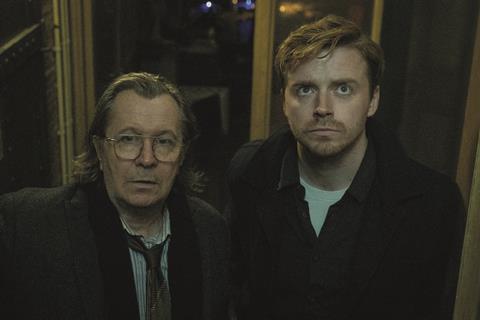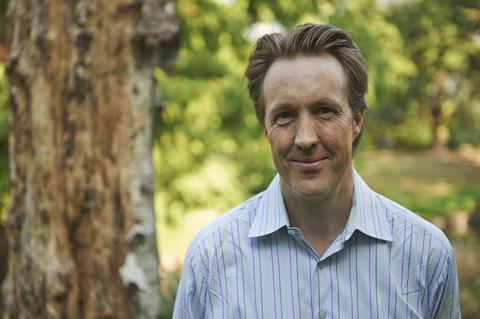
Apple TV+’s Slow Horses has been one of the streamers’ biggest hits, while also racking up critical plaudits since the first season debuted in April 2022.
Based on the Slough House book series by Mick Herron, about a group of disgraced MI5 spies working for the flatulent and coarse Jackson Lamb (Gary Oldman), Slow Horses combines spy-show thrills and workplace comedy.
With season four set to air in September, Slow Horses has finally been recognised with nine Primetime Emmy nominations. The show’s third season is up for outstanding drama series, Oldman nominated for outstanding lead actor in a drama series, Jack Lowden nominated for outstanding supporting actor in a drama, and Jonathan Pryce nominated for outstanding guest actor.

Showrunner Will Smith, a veteran of Veep and The Thick Of It, is nominated for best writing in drama series, for the episode ‘Negotiating With Tigers’, while Nina Gold is nominated for casting, director Saul Metzstein for season three opener ‘Strange Games’, editor Zsófia Tálas for the episode ‘Footprints’, and Daniel Pemberton for outstanding music composition for a series.
Screen sat down with Smith ahead of season four’s launch on September 4 and the Primetime Emmys awards ceremony on September 16.
It’s taken the Emmys until season three to acknowledge Slow Horses. Did you think that recognition might never come?
For me, the work is the joy and the prize. I get to work with Gary Oldman, Kristin Scott Thomas, Jonathan Pryce, Saskia Reeves, so it feels like I’m already a winner. But I love that the show is building in awareness and acclaim. We’ve got one more week to shoot in September on series five, so we filmed five seasons before we got nominated for an Emmy, which means you’re slightly under the radar. But it does change the lens through which you’re viewed and certain pressures come with that. We get nominated for nine Emmys and I’m like, I’ve got to win 10 next year otherwise we’re perceived as sliding. We thought Gary had a strong chance, but I’m delighted for Saul and Zsófia and Nina and Daniel.
It’s a show that started strongly but has also improved with each season. Do you feel the pressure of having to continually up the ante?
I love all the series, just as I love all my children, but as you go on the actors are more familiar with the characters and find new notes to play. I was never worried about the tone, but [some] people were like, “Is it going to work?” And yes, it does work.
Luckily the books always take it in different directions and Mick kills a lot of his characters, so he’s continually refreshing the toolbox in a good way. Because, with TV, it has to be the same, but different. You set yourself challenges, so you don’t repeat the same kinds of scenes, the same kinds of moments. And in the third series, the scale was elevated. We start in Istanbul, and then we end with this big shootout in a Bond base, basically, but it still feels like the show. That’s what I love about it – you can have different emphases, you can go to different places and focus on different characters, but it still feels the same.
When you signed on, Mick had only written two books. Do you discuss with him where the series and characters are going? Does he talk to you about the books in advance of publication?
No, he’s quite secretive about what he’s doing, but I usually get to see very early drafts [of the books]. He comes into the [writers’] room at the beginning [of each season] and maybe the middle and then at the end, and so I always talk him through what we’re changing and why and he’ll input on that. I always want Mick’s blessing. It’s important Mick is happy with what we’re doing, because he’s created this fantastic world and we want to do it justice.
You mentioned that, in the beginning, people were uncertain about the show’s tone. Can you talk about the challenges of balancing humour with action?
The shorthand pitch for Slow Horses could be Tinker, Tailor meets The Thick Of It. The books are laugh-out-loud funny but they’re not in the humour section of the bookshop, they’re in the thriller section. One of the things I learned from Armando Iannucci [on The Thick Of It] was that I never want it to sound like they’re doing a joke, and we’ll cut it if it feels like it’s a joke or somebody’s trying to be funny to make the audience laugh.
The thing they’re saying should feel like the natural, organic thing to say within the scene. You have license to do that with a character like Lamb, because Lamb is funny, but it’s a character thing. He’s using it as a tool. He uses it to disarm people, unnerve people, throw them off balance. And because Mick had done it in the books, I thought, “We can do it.”
If you think of great American TV dramas like The Sopranos, The Shield, The Wire and Deadwood, they have funny moments. The scenes with Tony Soprano and his mother are as funny as any sitcom. But I don’t feel I’m watching comedy characters at all. It’s one of the greatest dramas of all time – and it’s laugh-out-loud funny.
You’ve said you learned from Armando Iannucci about writing for the actor, so how does Gary Oldman’s Lamb compare to the character in the books?
He’s physically different in the books, he’s lot bigger in the books, but Gary acts the weight. And I’d say that in the books there’s not a lot of heart to Lamb, he’s pure bastard. Gary has injected a scintilla of humanity, which I love, because you feel the hurt and the pain that is driving this front, and Gary will give you little glimpses of what he’s been through. So it’s Gary’s version of the character.
We collaborate as well. He will come to me with stuff. The brilliant thing about Gary is he’s not just one of the greatest actors of his generation, he’s a brilliant writer and a brilliant director in his own right. He can think about things 360 and he’s got a great overview. It’s a total joy.
Lamb’s relationship with Jack Lowden’s River Cartwright is a key dynamic. You’re never quite sure if River is incompetent, arrogant or simply misunderstood.
River’s not as good as he thinks he is and [in season 3] gets screwed over by Spider [Freddie Fox]. What I love about the books and the show is that River feels like a fully-rounded character in a genre piece, and you can have tremendous fun with that. Jack is such a talented actor and works so hard and can play all these different things at once. He’s a great comic actor. He’s a great dramatic actor. And his scenes with Jonathan Pryce are just astonishing.
Jonathan Pryce brings so much to a small role as River’s grandfather, who, in the latest season, starts showing signs of dementia.
He normally has two scenes a season, but, my God, they have an impact. Jonathan’s extraordinary. Watching him and Jack do that scene where he goes to the club and he’s frustrated and thinks he’s still a member and he’s not. Then you see it dawn on him, and it felt so real and so compelling. Off the back of that, I wrote a scene we have in series four because I could see where those two [actors] could take those scenes and that dynamic and how heartbreaking and true and resonant it is for a lot of people who go through that, including myself, when you see that decline of elder family members who you love.
Again, we felt we could do something very deep and moving within an action show. So in that final ep, you’ve got all the fun of the shootouts and the villains getting their comeuppance. Then, you’ve got a scene where River realises his grandfather is declining – and that maybe his grandfather is not the morally upstanding man he thought. You see the fracturing of their relationship.
The brilliance of those actors is they can change up, and we can take the characters somewhere you don’t expect in a spy show.























No comments yet